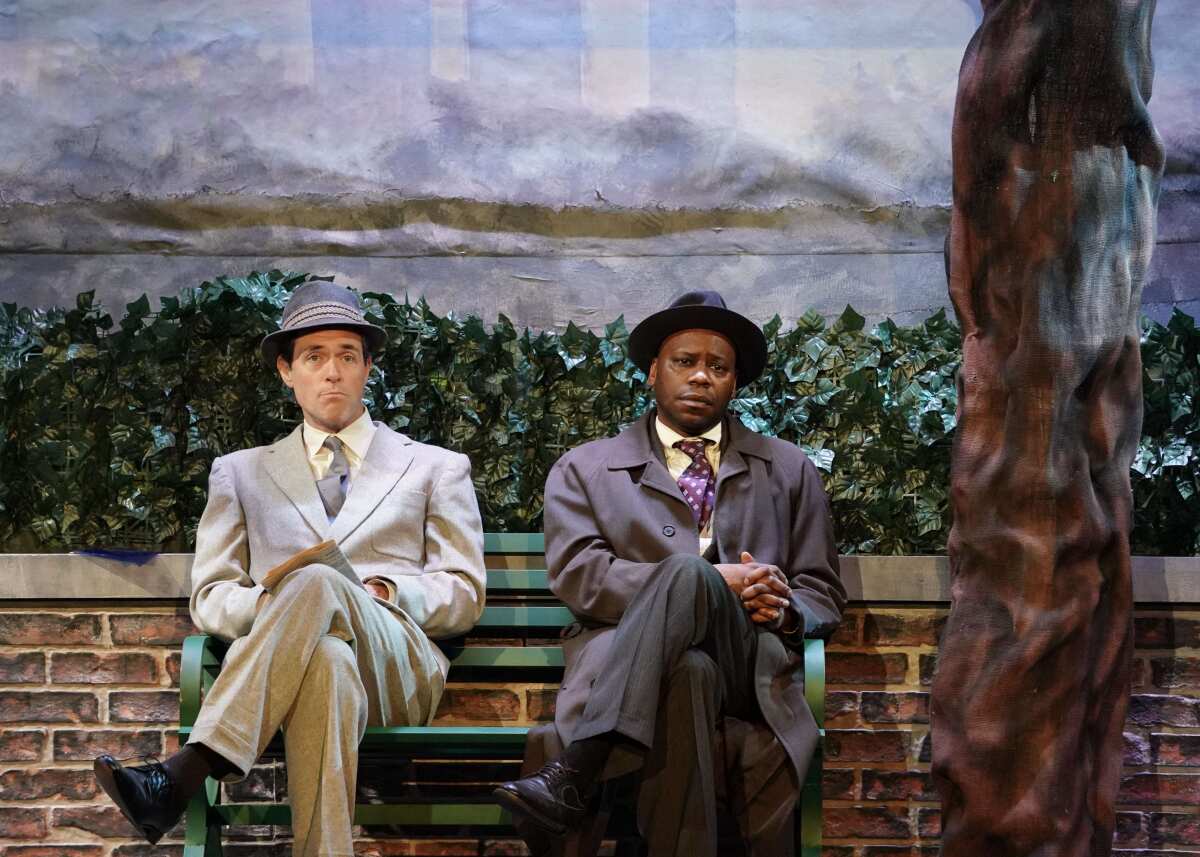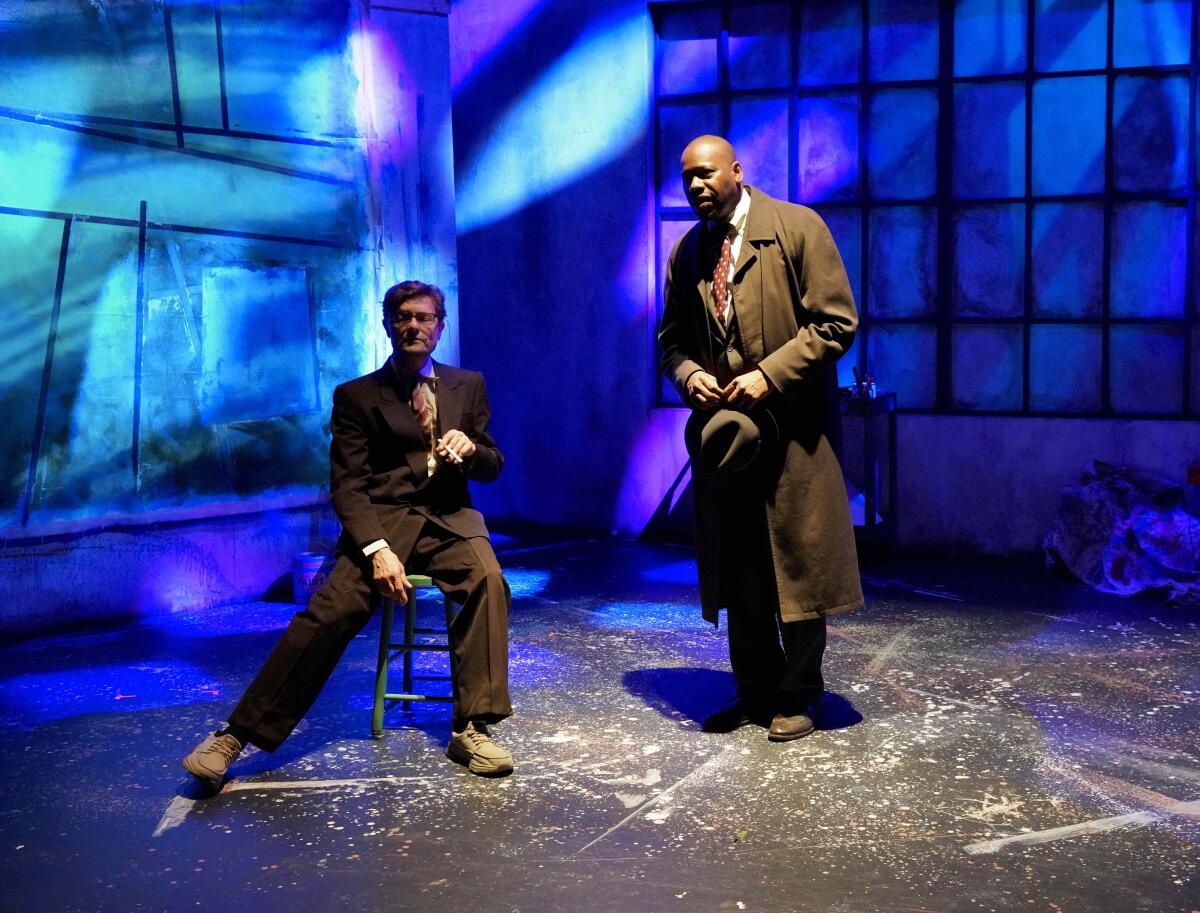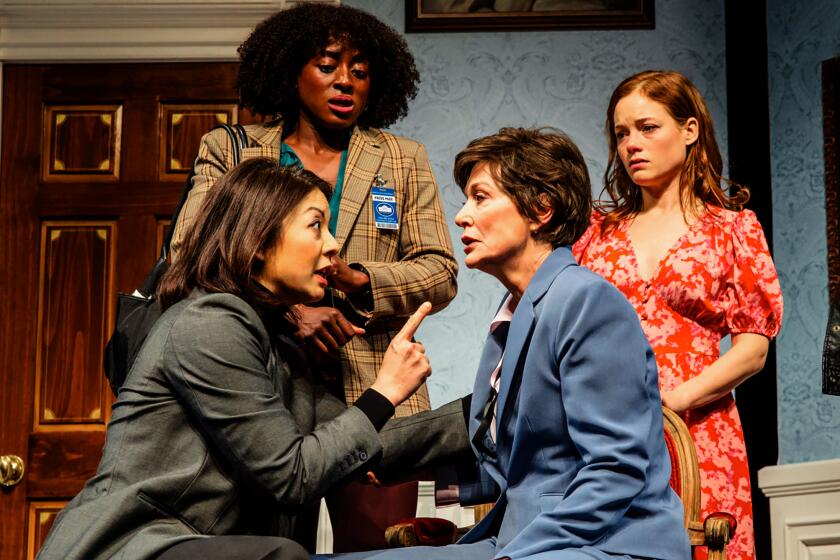Review: Abstract expressionism, espionage and Cold War history converge in John Ross Bowie’s ‘Brushstroke’

- Share via
History, as we’re learning hourly from the example of Donald Trump, can really stretch credulity. If you had pitched his unlikely political story to a Hollywood studio a decade ago, you’d probably have been laughed out of the meeting.
Fiction is expected to stay within the bounds of plausibility. But life has its own ideas about realism.
Consider the plot of “Brushstroke,” a new play by actor-writer John Ross Bowie, who was a memorable sad-sack in Aaron Posner’s Chekhov-inspired comedy “Life Sucks” last fall. The play, which is having its world premiere (running through March 3) in a production directed by Casey Stangl, is billed as a “comedic thriller.”
Genre confusion aside, “Brushstroke” tells a rather intricate Cold War espionage tale involving New York’s East Village art scene during the heyday of Abstract Expressionism. This puzzle box of a play conceals conspiracies inside a master conspiracy.
Audiences may have trouble gaining traction, but the plot is full of surprises. Perhaps most startling of all is the discovery that this crazy story, shot through with outré humor, isn’t completely fabricated.
‘POTUS,’ Selina Fillinger’s farce about the women charged with keeping a misbehaving president in line, has its L.A. premiere at the Geffen Playhouse in a production directed by Jennifer Chambers.
Marvin (Malcolm Barrett) works for an organization called the Congress for Cultural Freedom. A mild-mannered guy with gleeful enthusiasm for abstract art, he enters the studio of Ted Berkow (James Urbaniak) and starts passionately describing the effect the canvas has on him.

It’s a shock to Marvin that the guy skeptically listening to his ardent spiel is the artist himself. A friendship develops in which Marvin offers money to lure Ted into participating in his organization’s mission to counteract the threat of Soviet Communism in Europe through homegrown, path-breaking art.
A European exhibit of new American painting is being planned to win hearts and minds abroad by showcasing the creativity that’s made possible by democratic freedom. Ted, whose phone isn’t working because of his unpaid bill, is susceptible to the lure of ready cash. He keeps his studio door open to Marvin, who studied art history at Yale and comes alive when talking about such things as the bold gestures of action painting. Marijuana, always at hand, keeps the conversation bubbling.
Radical brushstrokes aren’t the only thing that catches Marvin’s attention. Susan (Evangeline Edwards), Ted’s sister who works as his assistant at the studio, captivates Marvin as much as the works of art he’s trying to conscript into his soft-power campaign.
A relationship triangle, as cockeyed as anything by Picasso, forms. Ted grows possessive with Marvin, not appreciating that his newfound friend’s childlike wonder is being diverted from his canvases to Susan. But these dynamics are uncertain in a play that treats identity like a game of three-card monte.
A radical reworking of Shakespeare’s “Romeo and Juliet” by acclaimed choreographer Matthew Bourne gets its North American premiere at the Ahmanson Theatre in L.A.
Even before we overhear Marvin speaking in code with his boss, Allan (Brendan Hines), who suspects Ted of being “Red,” it is clear that the characters are not exactly who they claim to be.
But might art be, beyond a tool of propaganda, a vehicle for truthful self-expression, a way of communicating a deeper self?
Any further discussion of the plot will spoil the twists, but Bowie hasn’t yet organized his material for maximum dramatic effect. “Brushstroke” loses momentum after its initial setup, in part because it’s not at all clear which direction the play is moving. The stakes are lacking because it’s hard to invest in a story conspicuously built on quicksand.
Perhaps a less linear chronology, one that flashes ahead to a climactic moment (there is more than one) before dramatizing how it came about, would make for a more gripping experience. Such a strategy might help foreground the play’s historical roots. The alliance forged between American diplomacy and modern art against Soviet propaganda isn’t a figment of the author’s hyperactive imagination.

Situated in an artist studio vividly brought to life by scenic designer Keith Mitchell and prop designer/scenic painter Joyce Hunter, the play relies heavily on the actors to sustain our interest.
Barrett is the heart and soul of Stangl’s production. He brings an endearing innocence to Marvin’s excitement about modern painting. Better still, he establishes the character’s vulnerability long before we have any idea of the circumstances of Marvin’s entry into this bohemian world.
Urbaniak, an Obie-winning veteran of New York’s downtown performance scene who has become a go-to character actor for some of the most adventurous American film auteurs (Hal Hartley, Todd Haynes and Richard Linklater, among them), wraps Ted in an enigma that manages to be simultaneously harmlessly eccentric and downright menacing.
Edwards, who distinguished herself in the Rogue Machine production of Will Arbery’s “Heroes of the Fourth Turning,” achieves a similar balance between openness and secrecy with Susan. But her character is a touch too hazily constructed.
Hines’ Allan can’t really do much more with his role than play up the film noir ambiance of spymaster scenes that have an inserted feeling. These pop-up exchanges break the rhythm of the tale without heightening its suspense.
“Brushstroke” has the makings of an intriguing Cold War thriller, but Bowie needs to recalibrate his clues into a more decisive dramatic scheme. Too often the play settles for a laugh line when what it really needs is the theatrical equivalent of clearer GPS coordinates.
'Brushstroke'
Where: Odyssey Theatre, 2055 S. Sepulveda Blvd., L.A.
When: 8 p.m. Tuesdays-Fridays, 2 and 8 p.m. Saturdays, 2 p.m. Sundays. Ends March 3.
Tickets: $25-$45, $55 premium seats.
Information: (310) 477-2055, ext. 2, or odysseytheatre.com
Running time: 1 hour, 30 minutes
More to Read
The biggest entertainment stories
Get our big stories about Hollywood, film, television, music, arts, culture and more right in your inbox as soon as they publish.
You may occasionally receive promotional content from the Los Angeles Times.













